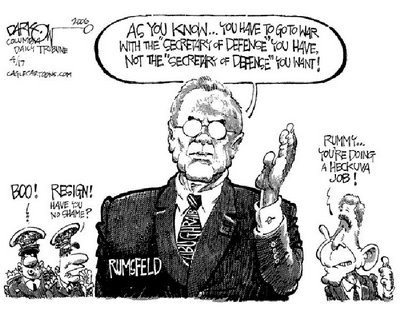 This week, the chorus of disgruntled (retired) generals calling for U.S. Secretary of Defense Donald Rumsfeld to join them in their idle-minded sinecure reached such a discordant crescendo that even the normally tone-deaf Rumsfeld took heed. And, in an unprecedented display of contrition and humanity, he stood before the members of the Pentagon press corps – for whom he has always shown a quizzical, if not supercilious, indifference – and expressed genuine regret for providing them so much fodder to caricature him as an arrogant, cantankerous, know-it-all (my-way-or-the-highway) ball-buster. Because, alas, it has finally dawned on Rumsfeld that his didactic lectures on war strategy have become about as reassuring to the American people as that “shock and awe” first strike against Iraq that was supposed to “end the war before it began”.
This week, the chorus of disgruntled (retired) generals calling for U.S. Secretary of Defense Donald Rumsfeld to join them in their idle-minded sinecure reached such a discordant crescendo that even the normally tone-deaf Rumsfeld took heed. And, in an unprecedented display of contrition and humanity, he stood before the members of the Pentagon press corps – for whom he has always shown a quizzical, if not supercilious, indifference – and expressed genuine regret for providing them so much fodder to caricature him as an arrogant, cantankerous, know-it-all (my-way-or-the-highway) ball-buster. Because, alas, it has finally dawned on Rumsfeld that his didactic lectures on war strategy have become about as reassuring to the American people as that “shock and awe” first strike against Iraq that was supposed to “end the war before it began”.
Nonetheless, even though a more humble Rumsfeld would help the Bush Administration win its public-relations battles with the American media, forcing him to retire would do nothing to help the American military win its war with the Iraqi insurgents. Besides, it’s not as if any of these generals are offering war strategies that differ from the one Rumsfeld is trying to execute. Instead, they’re just pussies now taking cheap shots at him from their cloistered retirement – by challenging Rumsfeld in the media in ways that, if they had any cajones, they would have challenged him to his face when they were still serving under his command.
Meanwhile, I think Rumsfeld should stay right where he is and let the world witness his transformation from the cocksure Oracle of America’s military might to an equivocating apologist for its pyrrhic accomplishments in Iraq.
NOTE: Click here for my constructive criticisms, which offer strategies for how Rumsfeld should prosecute this war that has become an Achilles heel not only for the Bush Administration but also for America’s presumptive power around the world.
UPDATE (2:15 pm): Judging from the emails I’ve received about this post, it seems I presumed too much by expecting you to follow the links to my previous articles to grasp my thoughts not only about the decision to invade Iraq but also about the way the war is being waged. Therefore, here’s the Cliff-Notes version:
I have written, repeatedly, that America’s march into Baghdad was sheer folly. And I thought it was a foolhardy idea to invade Iraq even when intelligence agencies from Russia to France thought Saddam Hussein possessed the WMDs that U.S. Secretary of State Colin Powell warned the world about during his United Nations address in February 2003.
Once Bush ordered troops into Iraq, however, I thought he should have followed the Powell Doctrine and sent in hundreds of thousands of them to secure every nook and cranny of the country, and under strict Martial Law conditions. (In fact, I had in mind 500,000, not the 300,000 General Shinseki suggested, and which got him fired.)
Now that things are a complete mess (as they have been for almost two years), I think it’s irresponsible for these generals to be sniping at Rumsfeld without offering a clear exit strategy for the troops on the ground. At least Congressman John Murtha is demanding a fazed retreat “to the horizon” – whatever that means. But no one in any leadership position or who has presidential ambitions is recommending anything Bush and Rummy are not already trying to do.
Yet carping political opportunists like Hillary Clinton and John Kerry, both of whom voted for this war (before Kerry voted against it – whatever that means), would have the world believe that they not only voted against it but have actually pleaded with Bush to change his strategy. Even Sen. John McCain seems equivocal about his initial support for the war. Though I suspect this is because he doesn’t want his call for more troops to appear to be an all too belated endorsement of the Powell Doctrine.
Unfortunately, now that Iraq has its own duly-elected government, the Powell Doctrine is no longer a viable option. All Bush and Rumsfeld can do, short of declaring victory and retreating in abject humiliation, is to keep recruiting Iraqis to insulate American troops from insurgent attacks and begin their orderly withdrawal commensurate with political developments in Iraq.
If anyone has a better idea, in substance, I’m sure Bush and Rumsfeld are desperate to hear it….
Secretary of Defense Donald Rumsfeld, Iraq war, resignation
Tom says
Excellent point ALH!
Bill says
Boy, your “Cliff-Notes version” makes more sense than most articles I’ve read on this war. It inspired me to go back and read your previous articles and am very impressed by your analyses and predictions.
How long do you think it will take the Iraqis to gain control so that all American troops can come home?
Thanks.